You use plastic bags when you go shopping, but what happens to them afterward?
You might not think it’s a big deal to use plastic bags, but just think of how many people around the world are also using them.
Five trillion plastic bags get used every year, as the United Nations Environment Programme (UNEP) reports.
Why are plastic bags so bad for the environment?
These bags end up in the ocean where they’re a choking hazard to animals and when they’re thrown into landfills they take centuries to decompose, releasing pollutants into the air and being a danger to land animals.
There are lots of good reasons why we should ban plastic bags.
If they’re not banned in the country where we live, then it’s important for us to ban them in our own households. Here’s why.
Contents
Plastic Bags Get Around Easily
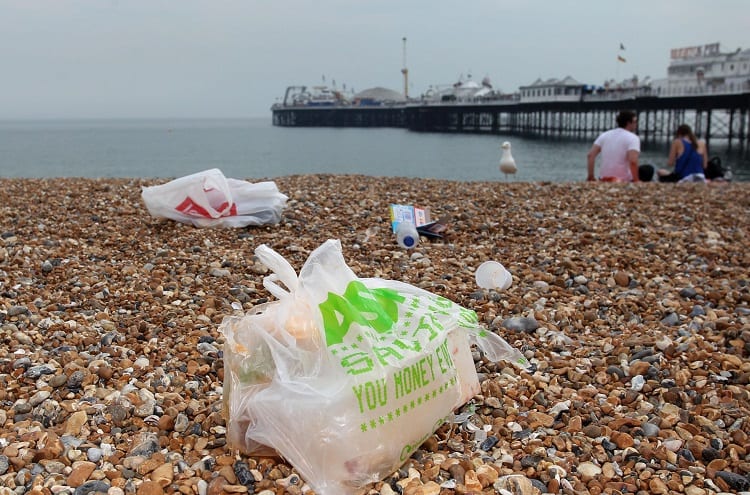
Plastic bag litter is a real problem.
As Green Tumble reports, millions of plastic bags get discarded and end up clogging water drainage channels and sewers, such as in cities like Bangladesh.
This is particularly problematic during the monsoon rain season. That small, light plastic bag that you use for your grocery shopping can travel easily.
Look around and you’ll see plastic bags everywhere: on the side of the road, in puddles, in trees, and in the ocean, polluting our environment.
Plastic Bags Are Contributing To Global Warming
Most plastic bags are made out of a substance called polyethylene.
This is produced from natural gas processing and crude oil refining, as Green Tumble reports, which are non-renewable fossil fuels that produce greenhouse gases – a huge culprit of global climate change!
Plastic Bags Are Toxic
It’s not just that plastic bags are contributing to climate change.
They’re also filled with toxic, harmful chemicals that include estrogen-like substances.
In an Environmental Health Perspectives report, when 450 plastic items, including flexible bags, were studied, it was found that over 70 percent of the plastic products released chemicals that mimicked estrogen.
This is dangerous because it means that the plastic has hormone-mimicking qualities.
These disrupt how hormones, such as but not limited to estrogen, behave in our bodies and this gives us a hormonal imbalance that can have serious effects on our health.
Plastic Bags Get Mistaken For Food By Animals
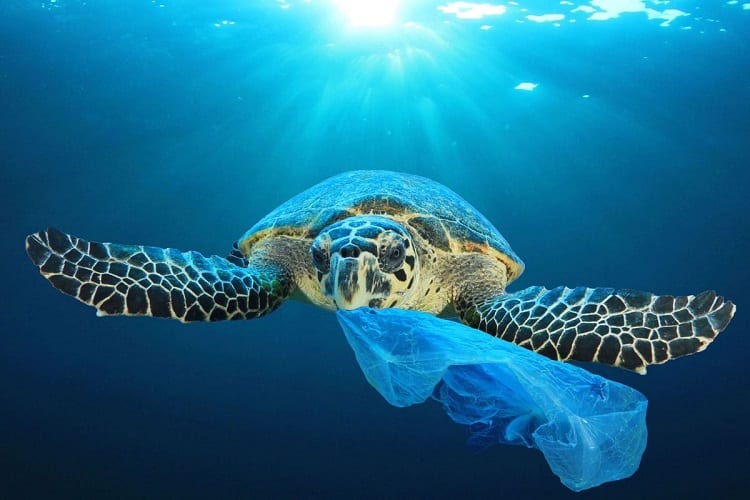
You might not think that animals would mistake plastic for food, but plastic bags take thousands of years to disintegrate.
During this time, they break down into small pieces that can be swallowed by marine and land animals.
A 2013 study found that almost 35 percent of turtle deaths are caused by the animals consuming plastic, Green Tumble reports.
In 2008 in Australia, a crocodile autopsy found 25 bags in its stomach, as ABC News reports.
Even birds are being affected.
According to a report by National Geographic, nearly every single seabird is eating plastic, as plastic that’s thrown away is found in 90 percent of them.
It’s clear that plastic bags are the cause of death for many different types of animals, both in the water and on land.
If we don’t slow down the production and waste of plastic bags, the future looks grim: by the year 2050, there will be more plastic in the ocean than fish, as the Ellen MacArthur Foundation reports.
Excellent Alternatives To Plastic Bags
Stop purchasing plastic bags and start using these environmentally-friendly options instead. Your health and the planet will thank you!
Canvas Bags
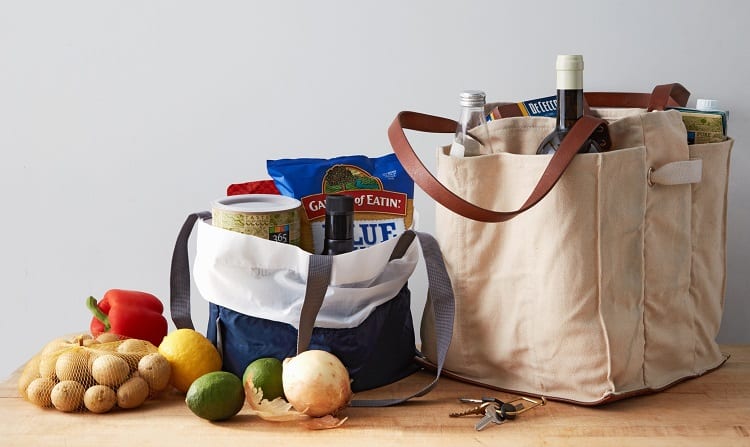
Put your grocery shopping into a canvas bag instead of a plastic bag, and you’ll reap the benefits immediately.
For starters, these bags are stronger and can carry more weight. They’re also super easy to clean and can be reused many times over.
However, not all canvas bags will be better for the environment.
When considering how they’re disposed of and preventing them from ending up in landfills, we also have to consider how they were made to find the most sustainable ones.
To make cotton canvas bags, cotton plants require lots of water, which makes them not as green as we think.
In addition, a Danish study reported by the Ministry of Environment and Food of Denmark found that a cotton tote needs to be used 7,100 times before it can match the global warming impact of a plastic bag.
A good bag to replace plastic should be made out of jute, as this plant fiber is compostable and biodegradable.
Polypropylene Bags
Non-woven polypropylene bags are a valuable alternative to plastic bags. The reason why is because polypropylene bags only have a carbon footprint of 47 pounds.
They’re even better than cotton bags, which have a carbon footprint of 600 pounds of carbon dioxide!
You only have to use a non-woven polypropylene bag 11 times to make it worthwhile – in other words, before its global warming impact is similar to that of single-use plastic bags.
In comparison, cotton bags have to be used 131 times before reaching that point, as Hello Homestead explains.
How Many Countries Ban Plastic Bags?
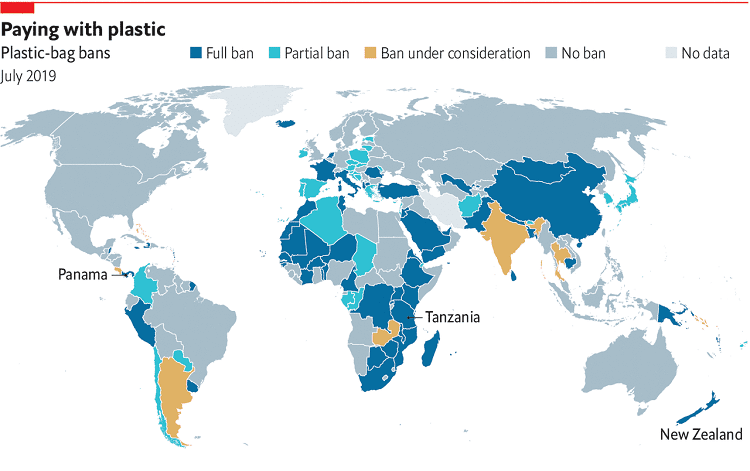
Currently, 127 countries have banned or taxed plastic bags, as The United Nations Organization reports.
However, “banning” sometimes refers to some sort of legislation that’s been put into action to try to regulate plastic bags.
This means that the countries have put laws into practice to limit the use and production of plastic bags.
How the legislation works vary from one country to the next.
The Marshall Islands have outright banned plastic bags. In Uzbekistan, there is a progressive phase-out of plastic bags.
In China, plastic bag imports are banned and the country requires that retailers charge people for plastic shopping bags, yet their exportation and production aren’t restricted, as the World Resources Institute reports.
Other countries ban plastic bags, but only if they are a certain thickness.
For example, Italy, France, and India are examples of some countries that tax or ban plastic bags that are less than 50 microns in thickness.
The reason for this is because thinner bags are more difficult to recycle and they can be blown away by the wind easier, which results in them traveling further afield.
When it comes to banning plastic bags in the U.S., 400 states or cities have imposed plastic ban or taxes.
There are eight states that ban single-use plastic bags, and these are Oregon, Vermont, California, Hawaii, Delaware, New York, Maine, and Connecticut.
New York’s ban will take effect in 2020 but will apply to single-use plastic bags you can get at grocery stores or retailers.
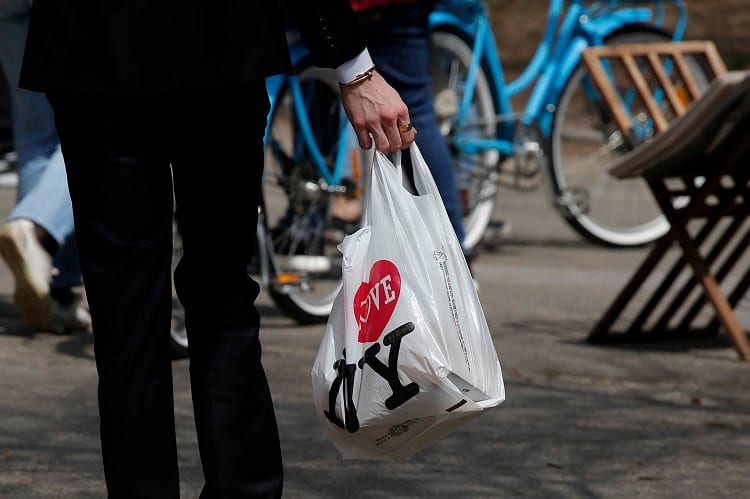
Plastic bags for prescription drugs, as well as newspaper bags and takeout bags from restaurants, are some examples of bags that will still be distributed.
In Hawaii, there’s a ban all across the state that forbids non-biodegradable plastic bags at checkouts and paper bags that are made from less than 40 percent recycled material, as the National Conference of State Legislatures reports.
Despite these regulations and bans, there is only one country in the world that actually restricts the production of plastic bags.
Cape Verde has a production limit that’s become more restrictive over the years.
In 2015, its plastic bag production percentage reduction was 60 percent, and by 2016 it reached 100 percent.
Now, people are only allowed to use compostable and biodegradable bags, as the World Resources Institute reports. If you’re interested to find out what qualifies a product’s biodegradability, you should check the biodegradable definition here!
It’s clear that there’s still some way to go when it comes to banning plastic bags.
However, by initiating your personal ban of plastic bags, you can make a difference, especially if you consider that approximately 100 billion plastic bags are used by U.S. consumers every year, as Earth Policy reports.
That translates to one person using a plastic bag every single day. Imagine if everyone stopped doing that. We could make a real difference.
Related Questions
What can you do with all the plastic bags you own?
Don’t throw them into the trash!
Find creative ways to reuse them as much as you can as this will prevent them from ending up in landfills.
It’s a responsible way to deal with the plastic problem we face on a global scale.
Should I throw out the cotton totes I already have?
No – the most important way to make the bags we own eco-friendlier, whether plastic or otherwise, is to use them as much as possible.
This prevents waste, and that should be our top priority.
Conclusion
Plastic bags are insidious.
While they look like something useful in the home, when they get disposed of they can cause serious problems for animals and the environment.
In this article, we’ve outlined some of the biggest dangers associated with plastic bags and how to use more sustainable options to reduce our waste and protect the environment.
